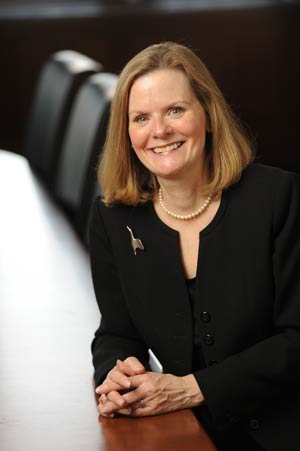
Photo by Chris Taggart
Nancy Busch, Ph.D., was a 22-year-old instructor at a Canadian university when she got the first intimation of the role she would one day play in higher education. A mentor told her she was going to end up as a dean.
That was before she had her doctorate, before she built a body of scholarship, before she became a full professor, before she really knew what a dean did. Her reaction at the time was “no way.”
Today, however, she embraces the role of dean, calling it “one of the greatest positions in a university”—one that, in some ways, mirrors the joys and satisfactions of being a full-time scholar.
For nine years she has been dean of the Graduate School of Arts and Sciences (GSAS), a role that entails constant learning about all academic fields. This duty is amplified by other, additional roles she has taken on in recent years. As chief research officer at Fordham and associate vice president for academic affairs, she advances research throughout the University while learning about finance, branding, leadership and other business skills.
Busch and other deans are playing leadership roles in promoting Excelsior/Ever Upward: The Campaign for Fordham, and she’s enjoying the challenge of explaining various research endeavors in layman’s terms.
Today, then, she has a new perspective on being a dean.
“To a certain extent, you continue to be a student forever,” she said. “You’re interviewing faculty members and learning about their cutting edge research as you interview them. You’re talking with students and finding out about what’s going on with their classes, with their research. It’s like somebody designed this program of lifelong learning for you, and it’s your job.”
Still, she understands the ambivalence felt by faculty members who are asked to step beyond the classroom to serve as administrators. She felt it herself. Her academic interests first took root in her high school years, in Denver, Colo., when she joined the federal Head Start program in its first summer as a volunteer in a preschool classroom.
She saw how children’s lives could be improved by intervening in their earliest years, and she was captivated.
“To a certain extent, it led me down the path of child development, developmental psychology, with the notion that there was information that scientists were learning about the way children grow and develop, and we could use that information to make things better for children who weren’t living in the same privileged environments that other children do,” she said.
She went on to earn two degrees in four years—a bachelor’s degree from Scripps College and a master’s in human development from a program jointly run by Wayne State University and the Merrill Palmer Institute. She had written an undergraduate thesis, but insisted on writing one for her master’s as well—“I wanted to learn how to do it better,” she said. She went on to start her doctorate at age 25.
Hers is a broad field, centered in psychology but touching on sociology, biology, nutrition and other areas of knowledge. She came to Fordham in 1983 as a lecturer in the Graduate School of Education and research associate at the University’s Hispanic Resource Center. She became chair of the Department of Psychology in 1991 and was named associate dean of GSAS in 1996 before becoming dean in 2000.
She misses human development research, but has found other satisfactions—mainly, empowering faculty by helping them secure research funding or build academic programs. Her current efforts include generating more research funding and opportunities for younger faculty, as well as bringing more recognition to research at Fordham and its student-centered approach.
While universities are sometimes categorized as teaching-focused or research-focused, Fordham integrates the two by pursuing research in ways that best develop the abilities of students, she said. She drew a comparison to the view in developmental psychology that what is good for the child is good for the family as a whole, and vice versa.
“What’s good for the student is ultimately what’s good for the University, because the University is about its students,” she said. “This also applies to the faculty—treat faculty well, empower them, and that is good for the University.”
